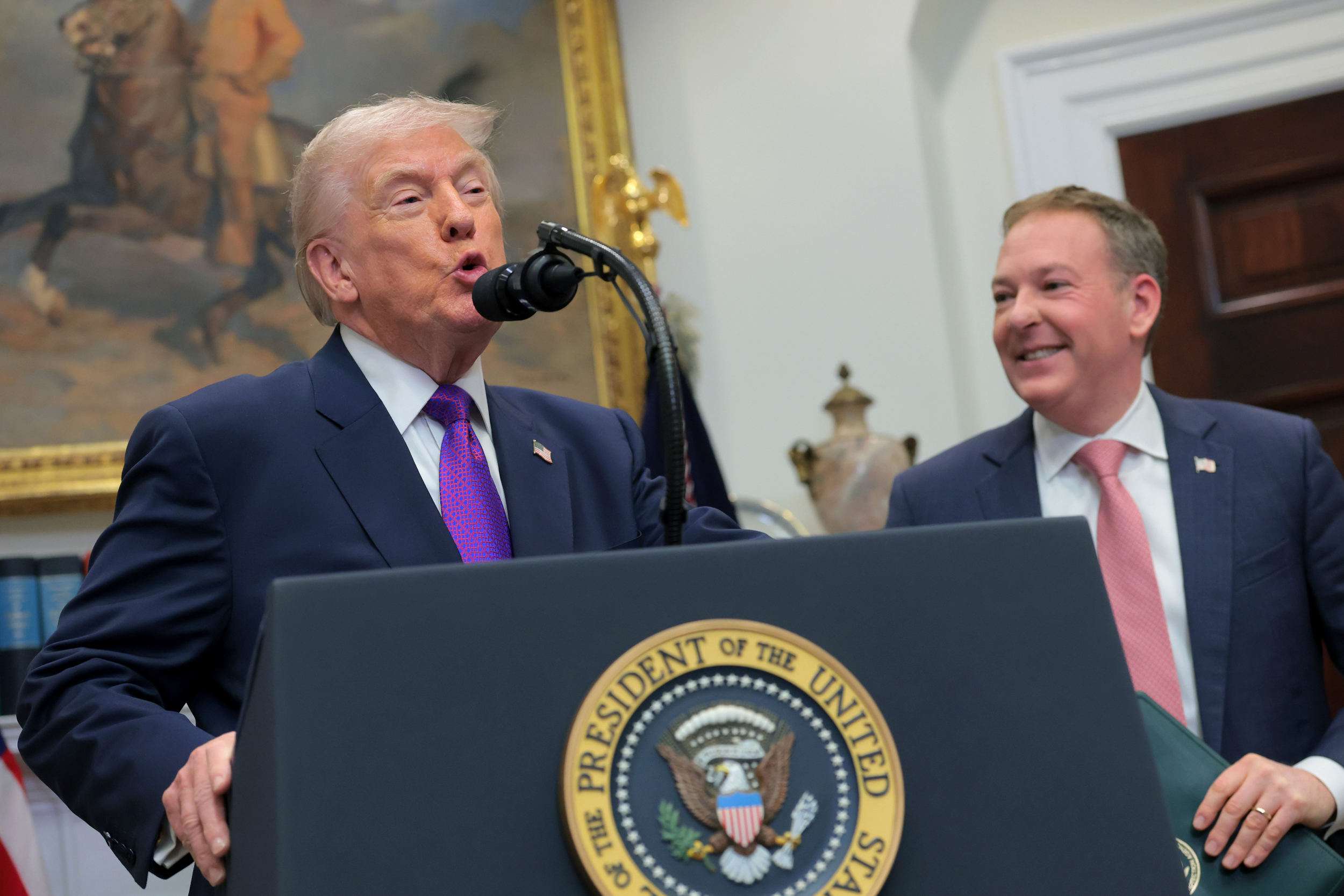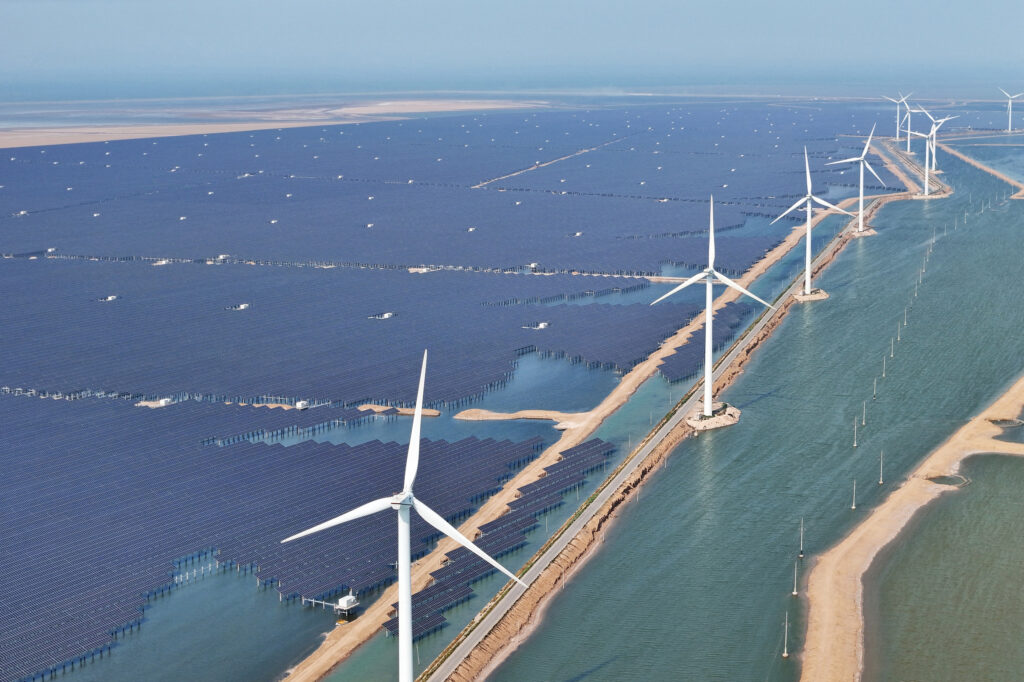Exactly where Brooke Rollins stands on agricultural policy is unclear, but her positions on fossil fuels and climate change are explicit.
After weeks of speculation, President-elect Donald Trump on Saturday announced Rollins as his pick to lead the sprawling U.S. Department of Agriculture (USDA). A Trump administration adviser, Rollins was not on any oddsmaker’s list of contenders to run the agency, which oversees nutrition programs, farm subsidies, agricultural conservation, forestry programs—and, under the Biden administration, significantly expanded programs to tackle climate change as it increasingly beats up American farms.
Rollins, a lawyer, has an agricultural development degree and grew up on a farm in Texas, but has little to no professional experience with agricultural policy. “She’s an unknown in ag circles,” said Ferd Hoefner, the former head of policy for the National Sustainable Agriculture Coalition.
The nomination puzzled many agriculture industry observers who had placed their bets on other potential nominees. “Maybe she was the last bon-bon in the box,” said Karen Perry Stillerman, deputy director of the food and environment program at the Union of Concerned Scientists. “He’s been doling out cabinet positions like candy.”
Rollins has been a staunch Trump loyalist for years. In a statement, Trump said “she did an incredible job during my first term as the director of Domestic Policy Council, director of the Office of American Innovation, and assistant to the President for Strategic Initiatives.”
Rollins called for the U.S. to withdraw from the Paris Agreement and applauded the administration’s attempts to repeal the Clean Power Plan, the Obama administration’s primary effort to reduce climate-warming emissions. She said, at a conference held by the conservative Heartland Institute in 2018, that “research of CO2 being a pollutant is just not valid.”
But just how Rollins’ positions against climate action translate to agricultural policy is very much unknown.
In the eight years since the last Trump administration began, American farms have been repeatedly battered by extreme weather, requiring the USDA to direct tens of billions of dollars in disaster relief and crop insurance payouts to the country’s farmers.
“Many more farmers have had their eyes opened to the threat of climate change,” Perry Stillerman said. “Many more farmers have benefited from these giant investments in farming and conservation, and have gotten some incentives and support to shift their practices. That may be harder than people think to wind back.”
Also during those years, the most powerful agricultural lobby group, the American Farm Bureau Federation, shifted its position on climate change, influencing conversations in farm country. The group had long denied the scientific consensus that human activity is driving greenhouse gas emissions, but has since softened its denial as funding for climate-focused programs has flowed to farmers and as carbon markets, based on carbon storing-farming practices, have promised the potential of revenue to its members.
So far, farms and farmers have received roughly $7 billion to help them implement “climate smart” farming practices under the Biden administration’s signature climate legislation, the Inflation Reduction Act. Another $13 billion or so is still on the way, though Congress’ efforts to pass a Farm Bill, which would direct those funds in coming years, are stalled. Republican versions of the legislation call for removing the requirement that the funding support climate-specific practices.
The USDA is investing another $3 billion in climate-focused agricultural practices under the agency’s Partnership for Climate Smart Commodities.
“No matter what happens in the Farm Bill, the USDA hands out billions and billions of dollars every year,” said Rebecca Riley, the managing director for food and agriculture at the Natural Resources Defense Council. “Rollins would have a huge influence over that.”
“Farmers are on the front lines of the climate crisis,” Riley added, “so if you’re the U.S. Secretary of Agriculture it’s hard to deny that climate change is a problem and it’s affecting the very people your agency is supposed to be supporting.”
Rollins is the founder and current president of the America First Policy Institute (AFPI), a group of Trump loyalists formed in 2020 by wealthy Texans that was heavily involved in Trump’s run for a second term. In Washington circles, it was known as Trump’s administration-in-waiting.
AFPI’s agenda calls for blocking foreign countries from purchasing American farmland, with the group applauding state bills that would prevent more purchases. The group is especially critical of China’s purchase of land, calling it a “threat to America.” But it says little else on agriculture, unlike Project 2025, the blueprint for Trump’s second term coordinated by the Heritage Foundation, which calls specifically for cutting back the Conservation Reserve Program and limiting crop insurance subsidies, among other rollbacks.
“There are no agriculture experts listed [on the AFPI agenda], so that tells you something,” Perry Stillerman said. “The only thing that’s listed is this misdirected concern about Chinese ownership of U.S. farmland, and that’s it.”
“Farmers are on the front lines of the climate crisis.”
— Rebecca Riley, Natural Resources Defense Council
Rollins was also the president and CEO of the Texas Public Policy Institute, a powerful pro-fossil fuels group that has funded efforts to block wind and solar development.
The fossil fuel and ethanol industries have long butted heads over the Renewable Fuel Standard (RFS), which calls for blending ethanol, mostly from corn, into the country’s fuel supply. Ethanol is one of the main drivers of the American farm economy, with 40 percent of the country’s corn—its most lucrative and widely grown crop—going into gas tanks. Though the RFS was intended to support a cleaner, homegrown alternative to fossil fuels, research has questioned its greenhouse gas benefits.
“Where this administration comes down between the mighty oil and gas and mighty ethanol lobby remains to be seen,” Hoefner wrote in an email, “though if Trump 1.0 is any indication, they will do lots for the former, but a little for the latter, and try to split the baby.”
Farm advocacy groups say they are digging into Rollins’ record and trying to prepare for a Senate confirmation hearing.
“What are the questions we should be asking?” Perry Stillerman said. “We know so little.”
Perry Stillerman said her group and others plan to track the agency closely, watching to see if Rollins—or any other Trump nominee—directs the agency to do what it did in Trump’s first term. That includes moving research divisions from Washington to Kansas, stripping mentions of climate change from agency reports and its website and removing climate-relevant data.
Whatever happens, the impact of climate change is worsening conditions on American farms.
“Climate risk is rising,” said Ben Lilliston, of the Institute for Agriculture and Trade Policy, noting that 49 states are currently in drought. “Crop insurance and disaster payouts are rising. How will she respond to the climate-related challenges facing farmers?”
About This Story
Perhaps you noticed: This story, like all the news we publish, is free to read. That’s because Inside Climate News is a 501c3 nonprofit organization. We do not charge a subscription fee, lock our news behind a paywall, or clutter our website with ads. We make our news on climate and the environment freely available to you and anyone who wants it.
That’s not all. We also share our news for free with scores of other media organizations around the country. Many of them can’t afford to do environmental journalism of their own. We’ve built bureaus from coast to coast to report local stories, collaborate with local newsrooms and co-publish articles so that this vital work is shared as widely as possible.
Two of us launched ICN in 2007. Six years later we earned a Pulitzer Prize for National Reporting, and now we run the oldest and largest dedicated climate newsroom in the nation. We tell the story in all its complexity. We hold polluters accountable. We expose environmental injustice. We debunk misinformation. We scrutinize solutions and inspire action.
Donations from readers like you fund every aspect of what we do. If you don’t already, will you support our ongoing work, our reporting on the biggest crisis facing our planet, and help us reach even more readers in more places?
Please take a moment to make a tax-deductible donation. Every one of them makes a difference.
Thank you,

















